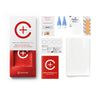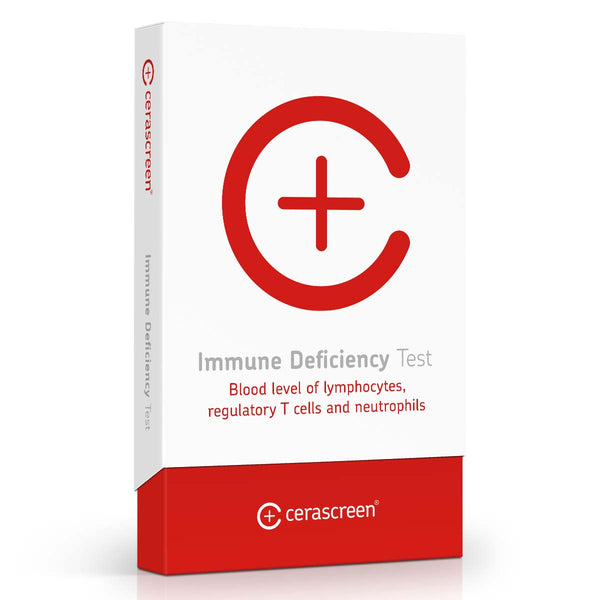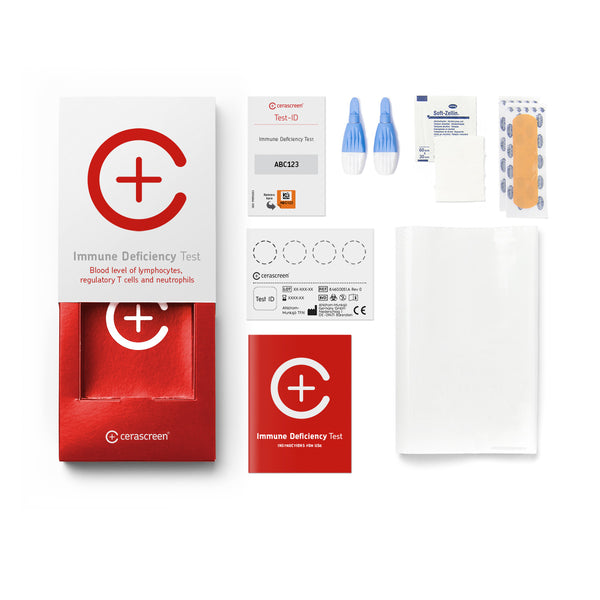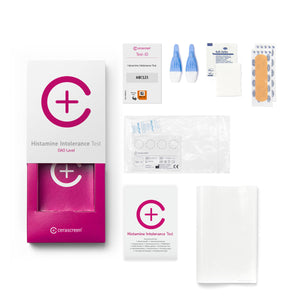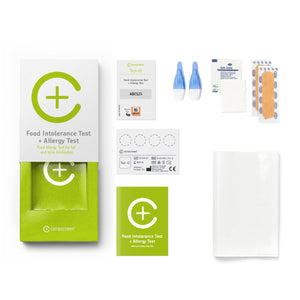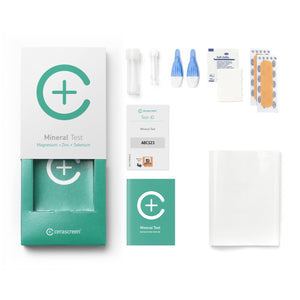product_id = 6718033002555variant_id = template_name =
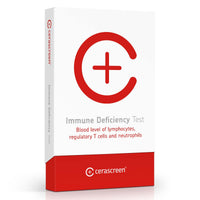
Immune System Deficiency Test
About the test
The cerascreen® Immune System Deficiency Test measures the number of immune cells in your blood – that is, lymphocytes and granulocytes. These include various types of T and B cells and natural killer cells, as well as neutrophil granulocytes.
All of these cells play an important role in your immune system – measuring the number of them present in your blood can give you vital information about the state of your immune system and possible infections. Values well outside the normal range may indicate autoimmune diseases and a possible immune deficiency.
Immune System Deficiency Test
- Take your sample at home – conveniently and discreetly
- Have your blood professionally analysed in a medical laboratory
- Receive recommendations on how to strengthen your immune system on a daily basis
- Receive results within 48 hours after the lab has received the sample
- Please note: The cerascreen® Immune System Deficiency Test does not replace medical advice or diagnosis. If you receive unexpected results, please consult your doctor before taking any medical action.
Benefits of the Immune System Deficiency Test
Abnormal immune cell values can be an initial indication of immune deficiency, autoimmune diseases and other immune system disorders. With our Immune System Deficiency Test, you can learn more about how your immune system functions and how healthy it is.
You collect your sample for the cerascreen® Immune System Deficiency Test at home: there’s no need to squeeze in an appointment at your doctor’s or wait around in the surgery to be seen! It is a blood test, meaning all you need to do is collect a small sample of blood from your fingertip – a laboratory will then carry out the analysis by specialised experts.
Benefit from our expertise: cerascreen® is the market leader for medical send-in test kits in Europe, with eight years of experience in test development and analysis. We have developed more than 50 approved send-in test kits (medical devices), analysed 250,000 samples and serve 19 countries in Europe – and we have now also launched in the United States!

Result of the Immune System Deficiency Test
As soon as your sample has been analysed, you will receive your results report via the My cerascreen® app or your user account on our website. You can easily view the report on your smartphone, tablet or computer and print it out, if required.
The laboratory analysis shows you the number of lymphocytes and granulocytes measured in your blood. Find out when you should visit your doctor with the help of our recommendations. The comprehensive health information provided in the report explains the role of the various immune cells in your body and how you can strengthen your immune system on a daily basis.
Frequently asked questions about Immune System Deficiency Test
Why take the Immune System Deficiency Test?
If your immune system function is impaired, this not only makes you more susceptible to infections, but this can also increase the risk of various diseases. With the lymphocyte and neutrophil counts determined in this test, you can recognise the signs of infections and better assess the state of your immune system.
A low immune cell count may also indicate a secondary immune deficiency, which in turn may be a sign of autoimmune diseases, metabolic disorders or chronic infections.
Who should take the Immune System Deficiency Test?
The cerascreen® Immune System Deficiency Test can provide fascinating information for anyone who wants to know more about their own health and how their immune system works.
It is particularly interesting for people who think they have immune system problems or whose immune system is frequently challenged by pathogens.
If you suspect that you have an immune deficiency, our test can be used to discuss results in more detail with a doctor.
How does the blood test work?
For the Immune System Deficiency Test, take a small sample of blood from your fingertip with a lancet. Only a few drops of blood are needed for this. Collect the drops on a dried blood spot card – this way, you only have to take a very small amount of blood, and the sample can be stored for a long time.
Your sample is sent free of charge to a specialised medical laboratory in the return envelope provided. The laboratory analyses the proportion of lymphocytes and granulocytes in the total number of white blood cells.
After the analysis is complete, you will receive a notification, after which you will be able to access the results report via your account on our website or the My cerascreen® app.
How long does the analysis take in the laboratory?
Once your sample has arrived at the laboratory, it will be analyzed there by specialists. How long the analysis takes depends on the exact measuring method and the processes in the laboratory.
If the sample is sent on the correct days (Sunday to Tuesday), this makes it easier for the laboratory to adhere to the times.
For the Immune System Deficiency Test, the laboratory analysis is usually completed within 5 working days after the sample is received in the laboratory.
When should I take the Immune System Deficiency Test?
The results are strongly influenced by whether you are healthy at the time of taking the sample or whether you are suffering from an infection, such as the flu or a cold. You may therefore find that if you take the test when you are suffering from such an infection, the results may not be very helpful.
If your values were normal when you were healthy, it may be worth keeping another test for when you have symptoms of an illness. Then you may be able to compare values from both tests.
What do the results tell me?
The Immune System Deficiency Test results report tells you how many immune cells our laboratory has detected in your blood.
The results are presented as percentages, which indicate the proportion of either lymphocytes or granulocytes in the total number of white blood cells.
For comparison, you will be given normal ranges that have been collected from healthy people aged 18 to 71 years. For example, a normal range for T cells (CD3+) is between 11.30 and 33.17 per cent.
Which advice will I receive to boost my immune system?
If, after taking the Immune System Deficiency Test, the results indicate that your lymphocyte or granulocyte values are clearly outside the recommended ranges, we recommend that you contact your doctor.
If your values are just outside the reference ranges, this may indicate an existing infection – for example, a cold or the flu. In this case, you may want to take another test to check your values again after the infection has cleared.
In your results report, you will also receive a range of tips and recommendations that you can use to strengthen your immune system on a daily basis.
What are lymphocytes?
Lymphocytes are a subspecies of white blood cells (leukocytes). They are among the most important building blocks of the human immune system.
Lymphocytes include, among others, different types of T cells, B cells and natural killer cells.
These immune cells have different tasks in immune defence. For example, they produce antibodies, slow down the growth of tumour cells and can recognise and fight pathogens.
Regulatory T cells play a special role. In particular, they help to fight autoimmune diseases by preventing other immune cells from attacking their own cells.
Which lymphocytes are tested for?
The laboratory analyses a total of six different types of lymphocytes, which include B cells, T cells and natural killer cells. They all have different tasks in immune defence:
- T cells (CD3+) fight pathogens and inhibit the growth of cancer cells.
- T-cells (CD4+), the helper T-cells, recognise antigens (proteins of pathogens) and ensure the release of messenger substances that call other defence cells into action.
- T-cells (CD8+), the cytotoxic T-cells, destroy infected or degenerated cells in the body after antigens have been recognised in them.
- B cells (CD19+) are involved in the formation of antibodies.
- NK cells (CD16+ CD56dim), the natural killer cells, eliminate pathogens and cancer cells and initiate cell death of harmful cells in the body.
- Regulatory T cells are responsible for stopping the immune system when it threatens to attack the body. In this way, they help to protect against autoimmune diseases.
What are neutrophil granulocytes?
In addition to the various lymphocytes, our immunodeficiency test also measures the number of neutrophil granulocytes in your blood sample.
Granulocytes, like lymphocytes, are a subspecies of white blood cells. Neutrophilic granulocytes are also known as ‘small scavenger cells’. One of their tasks is to fight fungi and bacteria that invade the body.
A low number of neutrophil granulocytes may indicate certain infections – for example via bacteria, viruses or malaria. The number of neutrophils may also increase in cases of autoimmune diseases, bone marrow disorders or when taking certain medications.
If the concentration of neutrophils in your body is too high, infections via bacteria, viruses, fungi or parasites may also be the cause. Other possible causes are poisoning, gout, hormones and cancer.
How can I boost my immune system?
A fully functioning immune system helps your body to fight infections, prevent autoimmune diseases and stay healthy in the long term. It is therefore always a good idea to keep your immune system fighting fit in your everyday life.
Your lifestyle plays an important role in this. The following recommendations will help you to keep your immune system healthy:
Eat a varied diet: Make sure you don’t develop nutrient deficiencies. Eat plenty of fruit and vegetables and check your vitamin D intake regularly.
Exercise regularly: Exercise several times a week and make walking and cycling part of your daily routine.
Get enough sleep: Lymphocytes are produced during sleep – a lack of sleep leads to increased susceptibility to infection.
Reduce stress: Try to slow down the pace of your daily life when it becomes too hectic. Relaxation techniques such as yoga and meditation can also help.
Avoid or reduce alcohol and nicotine: Both of these substances interfere with the formation of immune cells.
You will receive more detailed advice on the above topics in your cerascreen® Immune System Deficiency Test results report.
Why are children under 18 not allowed to take the test?
Our tests are not suitable for underage children and adolescents under the age of 18. Under 18s cannot activate the tests online and therefore cannot receive a test result. We ask that you do not administer the tests to your children either.
Children and adolescents need much closer supervision and counselling regarding medical tests and their interpretation. Testing with lancets and chemicals is not without risk and would need to be closely supervised by guardians. In addition, the reference values we give are always based on adult data. In the case of children, the risk of misinterpreting the results would be very high.
We want to fulfil our responsibility as a provider of medical products and ensure that children and adolescents are not unsettled by measurement results that are difficult for them to interpret. Since we cannot control whether the minors' legal guardians actually consent to the test being carried out and supervise them, we exclude tests for under 18s altogether.
If you are under 18 and have purchased a test, please contact our customer support.
Why does it take up to a week for the sample to reach the lab?
Please bear in mind that your results will not be analyzed in the UK but in Germany. For that reason, it can take up to a week for the sample to arrive at the lab. This does not affect the stability of the samples, as the method we are using is optimized for long transports.
Initially, your sample is sent to our collection center in the UK. From there, it is shipped to our central sample sorting facility in Germany, which then distributes samples to our partner laboratories. Once your sample is analyzed there, you will receive a notification and can access your result online.
Please check your mailbox regularly. We will notify you as soon as your sample is sent, arrives, or is analyzed.
Why does the test have an expiration date?
The cerascreen® test kits are CE-marked medical devices, which in turn include other certified medical components such as lancets, patches, and alcohol swabs used in blood tests.
Like most medical devices, these components have an expiration date to ensure that they remain safe and effective. Many of our sample carriers – such as dried blood cards or sample tubes – are chemically treated to keep your sample stable and analyzable in our laboratory. Over time, environmental factors can affect this treatment and compromise accuracy.
Our sterile, single-use lancets also carry an expiration date to guarantee sterility and safe use up to that time.
This is how it works
1. Test at home
Your test kit contains everything you need to draw a small sample of blood from your fingertip. Then send the sample back to us free of charge in the enclosed return envelope.
2. View results online
After the evaluation in the medical specialist laboratory, you will have online access to your personal result report.
3. Act
Your access to the test results and the evidence-based findings and tips to improve your health: the my cerascreen® user profile on our website or our app.



